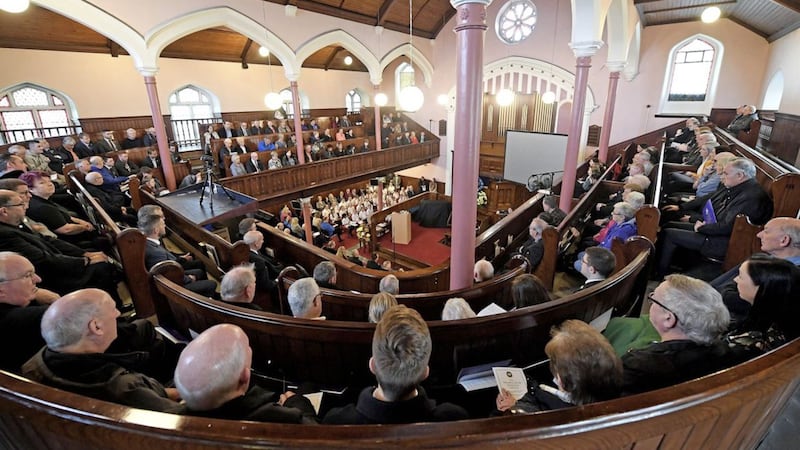There have been three occasions during my lifetime when I thought it was possible that Northern Ireland would tip over the edge and plunge into civil war.
The first was during the 1974 Ulster Worker's Council strike, organised to bring down the Faulkner/SDLP attempt at power-sharing. My concern was the presence on the streets of so many young and angry loyalists (particularly the thousands who had joined the UDA in the previous year or so), combined with new political parties and fringe groups with no experience of leadership or control.
The second was the immediate aftermath of the Anglo-Irish Agreement in November 1985. For about 15 years unionist/loyalist leaders had accused successive UK governments of 'spinelessness,' 'appeasement' and 'congenital weakness.' But with the signing of the Agreement - particularly by Margaret Thatcher, long regarded as an uber-unionist - they felt the full force of betrayal. And it wasn't just the harder edges of unionism/loyalism which felt betrayed; the feeling ran right across the pro-Union family. That sense that maybe, just maybe, they were on their own.
The third time was this week 25 years ago; the week that began with a bomb on the Shankill Road and ended with a gun attack at Greysteel. 23 people died that week, making that October the worst month for deaths since 1976 and that week one of the bloodiest weeks of the entire Troubles. People were afraid. Afraid irrespective of where they lived, because it was one of those moments when none of us could assume that were we where was 'usually safe.' It wasn't just the fear of tit-for-tat retaliation: it was the absolute certainty of it.
On Monday evening I tweeted a picture of page 62 of Northern Ireland A Political Directory 1968-1999. That's the page that sets out the events of that week from October 1993. Even now it is difficult to read. I was actually sitting at home, eating lunch, when I heard the bomb. About 45 minutes later a friend phoned: "This is bad, Alex. Really, really bad. Families and kids...." At that point he broke down.
The response to the tweet was interesting. My younger followers - many of whom weren't even alive in October 1993 - were clearly shocked by the scale of the violence. Sometimes you need to see something written down in black and white: stark, brutal, graphic, horrible. That was the world their parents grew up in: a world in which guns and bombs - and the possibility of being in the wrong place at the wrong time - had to be factored into your everyday lifestyle. We often hear people talk of not being 'dragged back to the bad old days,' yet there is now a whole generation who don't even know what that means.
My older followers tended to the view: ''However bad things are now, they are, at least, much better than they were in October 1993. The Good Friday Agreement is responsible for this.'' That is true. We lived through it. It was often ghastly. That collective act of gathering around the radio and television for the late night local news has gone: although it only seems like five minutes ago that I used to have to find a public call box and phone my Mum to let her know that I had been nowhere near the bomb or shooting she had just heard about.
And yet, some things haven't changed. There were people saying during the week that the Good Friday Agreement was too high a price to pay for putting terrorists at the heart of government. Others saying that the entire peace process, from the Downing Street Declaration onwards (less than two months after Shankill and Greysteel), was just about appeasing rather than defeating the IRA.
Someone told me on Tuesday afternoon that the peace process was the worst thing that had ever happened to Northern Ireland: "The IRA were terrified by the tit-for-tat stuff 25 years ago because they believed that if the war was coming more and more to the doorsteps of ordinary Catholics then they would suffer a huge backlash and fall of support. And they also knew they had been so heavily infiltrated by British intelligence that they could barely do anything. We should have kept the foot on their necks at that point. Now they're organising for border polls and unity. Yea, there would have been a few more deaths, but SF/IRA was on the losing side at that point."
In the prolonged absence of either direct rule or the rebooting of the Executive there will be a return of despair. And despair usually leads to catastrophic consequences. In my own lifetime Northern Ireland has almost gone over the cliff three times. We got lucky: although lucky is the wrong word entirely. We need to be extraordinarily careful right now. We won't always be lucky.








